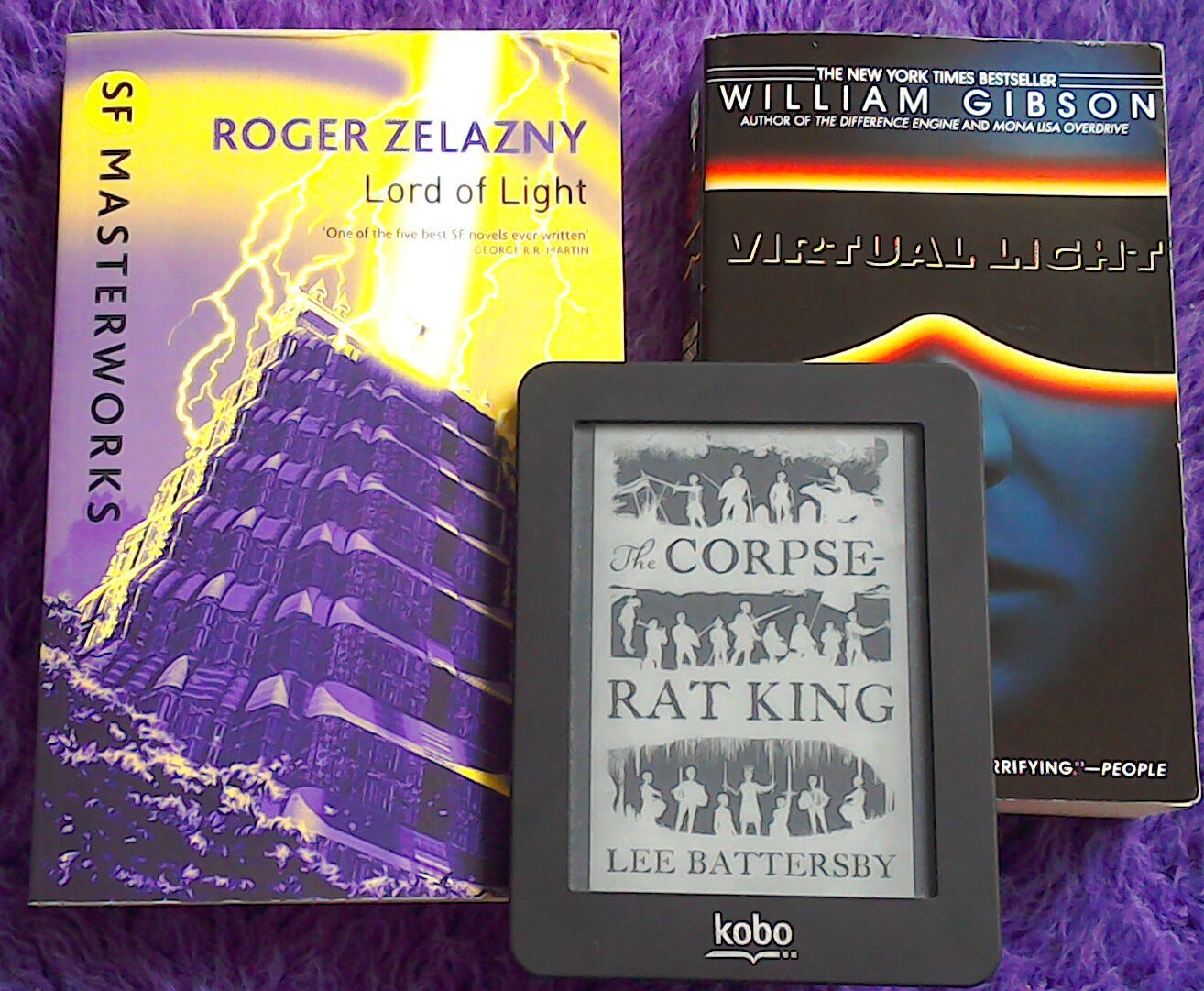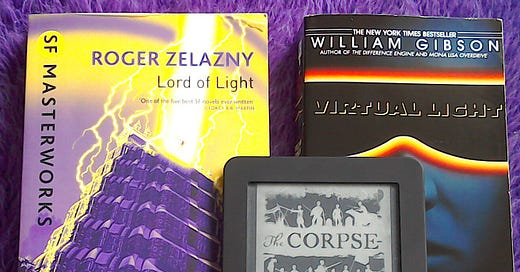A quick SFF round-up
Possibly as an attempt to escape from real events, I've spent the last 4 months almost exclusively reading fantasy and sci-fi. Some newish, most not, and due to slow reading and assorted distractions I haven't felt capable of writing proper reviews of any of them. However, a quick summary may suffice to prompt some of you to check out some of them, so here's a rattle through The Corpse-Rat King by Lee Battersby, The Interminables by Paige Orwin, The Body Library by Jeff Noon, Lord of Light by Roger Zelazny, and Virtual Light by William Gibson.

The Corpse-Rat King by Lee Battersby was one of four ebooks I bought from Angry Robot at the start of lockdown, when they had their Shelf Isolation offer on. It's easy-to-read comic fantasy in the Terry Pratchett/Tom Holt tradition which was a godsend in the early days of corona-anxiety. Marius don Hellespont is a corpse-rat, a looter of the dead on battlefields. He gets mistaken for a dead king and taken to rule the kingdom of the dead. They'll let him go if he finds them a replacement king: cue highly entertaining quest/chase. It was Battersby's debut, from 2012, and there is a sequel available.
The Interminables by Paige Orwin is another debut from Angry Robot (this time from 2016) with a sequel now available. It's set in a post-apocalyptic 2020, which seemed too fitting! It's also one of the most compelling and original fantasies I've read in a long time. The east coast of the USA is ruled by wizards (not the pointy-hat and wand variety, more like technocrats of a particular type) attempting to keep the fragile peace intact. The central partnership consists of a ghost and a jazz-loving near-immortal from the 1940s, and they need to investigate an arms-smuggling ring. Of course it's never that simple, and there are secrets and lies aplenty, and I was on the edge of my seat for ages.
The Body Library by Jeff Noon was another of my Angry Robot ebooks (I haven't read the fourth yet). Jeff Noon is more of a well-known name, and this book is the second of his Nyquist series, from 2018 (the first is A Man of Shadows, and the third, Creeping Jenny, has just been released). If you liked The Manual of Detection by Jedediah Berry and can stand your fantasy pretty dark, you'll love The Body Library. Private detective John Nyquist is on a simple tail job that turns out not to be, and finds himself mixed up in something beyond his understanding. It was weird and unsettling, blurring the lines between the fiction we're reading (the 'reality' of the novel) and the fiction within their world, focusing on worlds within books and the power of words. I haven't read the first Nyquist book because it sounded like it was firmly in the horror genre, and I had a nasty feeling this novel was heading that way too but it pulled back from the brink. Still not for the overly squeamish, I think, but I enjoyed it.
Lord of Light by Roger Zelazny is an odd (Hugo-winning) sci-fi novel from 1967. It's set on a planet where the technologically-advanced have set themselves up as Hindu deities in a pseudo-heaven, while the masses toil and worship. Buddha, or Sam as he's known to his friends, finds it tiresome and devotes his life (or lives) to disrupting the status quo. It's not an easy read, not least because the chronology is not straightforward (I think Chapter 1 happens later than the next few chapters), and if you don't have a passing familiarity with Hinduism and/or Buddhism I'd say you're going to get confused more than once. It is ultimately a good and thought-provoking novel, however, so if that doesn't put you off I'd give it a try.
Finally Virtual Light by William Gibson, which I can't believe I hadn't read. It's from 1993 but set in 2005, which of course is now further in the past than it was in the future when Gibson was writing it. I had to laugh at the portable fax machines, but the masks and the passing mentions of pandemics resonated. It's a proper thriller (albeit with a cyberpunk flavour) involving stolen wearable tech, bike couriers and a failed policeman, as well as weird millennial cults and big data. It occurred to me after reading it that so much Gibson (and many other stories) hinge on exploitative capitalist societies - people forced into situations because of their lack of money and/or status (need the money so bad to pay the rent/bills that they're prepared to do something illegal or against their principles, or can easily be manipulated into such). Depressing as that is, it does make for a cracking read.
If you found these mini-reviews useful, you can always buy me a cuppa...




